8 Home Remedies to Control Menopausal Hot Flashes
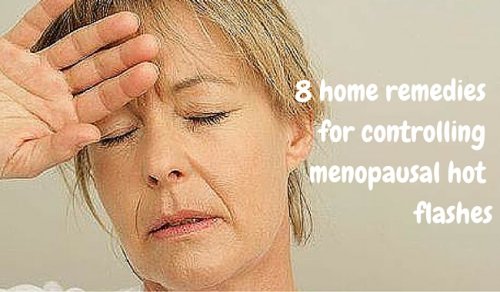
Menopausal hot flashes are an increasingly common symptom in older women, as confirmed in this study carried out by the University Polyclinic, Plaza de la Revolución (Cuba). When you reach menopause, it’s common for the body to suffer from stress and overheating.
One of the most common symptoms of menopause are these uncomfortable hot flashes, which often increase at night, causing increased tiredness.
Although, in general, hormonal changes can cause many other forms of discomfort, these hot flashes are one of most unpleasant side effects. Fortunately, they are treatable.
In fact, it is estimated that around 85% of the female population suffers from this condition during the first two years of menopause, as shown in the previously mentioned study by the University Polyclinic. Needless to say, a huge number of women suffer from this condition.
While this isn’t a serious health problem, it’s often fairly uncomfortable, as it disturbs sleep and can be frustrating.
Fortunately, over the years, several natural remedies have been discovered that can help control these symptoms, in order for them not to become so much of a problem.
In this article, we want to show you 8 of the best solutions, so that you can try the one that best suits you.
1. Linseed oil to control hot flashes
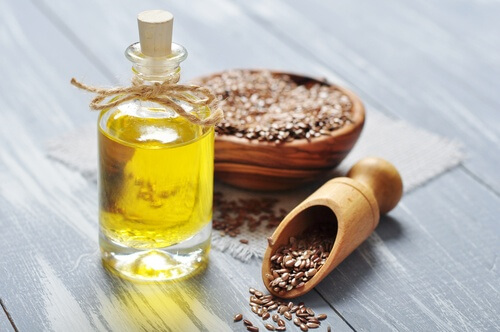
The omega-3 fatty acids contained in linseed oil are extremely healthy for women of this age. Their properties help to prevent cardiac diseases, reduce inflammation, and control many of the symptoms associated with menopause, as confirmed in this investigation carried out by the National Institute of Genomic Medicine in Mexico.
The plant-based lignans in this oil act as natural estrogen to counteract the loss of estrogen during menopause. As such, its properties can alleviate symptoms.
How to use it
- Use the oil in your salads, smoothies or favorite recipes.
- Take one tablespoon of oil on an empty stomach, every day.
2. Evening primrose oil
It’s believed that evening primrose oil can help to combat menopausal hot flashes. However, information obtained from the Murcia Department of Health (Spain) doesn’t recommend its use, due to a lack of scientific evidence.
How to use it
- Add a few drops to a glass of warm water and drink before going to bed.
- Use a small amount on your skin, focusing on major sweat areas.
3. Cloves
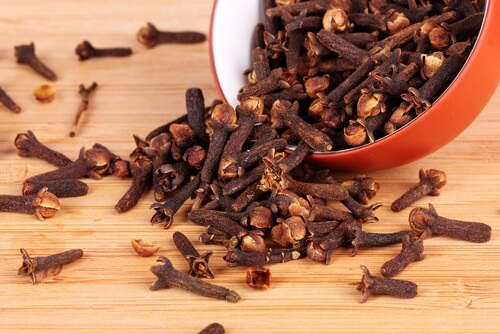
However, this study carried out by the Online Medical Community Platform refutes these claims.
4. Honey water
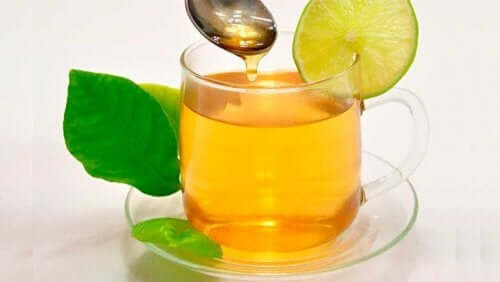
A simple mixture of honey and water is also a great way to control hot flashes, as confirmed in this investigation by the German Cancer Association.
Experts recommend adding a few drops to water to give it that healthy touch. This is a great remedy for the body.
Ingredients
- 1 Tbsp. honey (25 g)
- 1 glass water (250 ml)
How to use it
- Add the tablespoon of honey to the glass of hot water.
- Drink every night before going to bed.
5. Apple cider vinegar
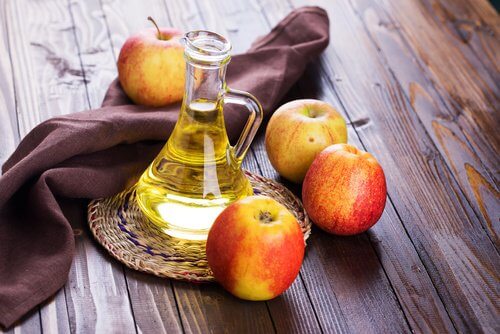
Organic apple cider vinegar contains 30 essential nutrients that revitalize and provide minerals for the body. It also contains vitamins A and B, mineral salts, and beneficial fatty compounds.
Its properties balance the body’s metabolism and help control hormones to mitigate menopausal discomfort. However, the studies that have been carried out up until now in relation to its hormonal effects on the body have only been tested on rodents.
Ingredients
- 2 Tbsp. pure apple cider vinegar (20 ml)
- 1 glass warm water (250 ml)
How to use it
- Dilute the apple cider vinegar in the glass of warm water.
- Drink it half an hour before going to bed.
- Avoid using refined apple cider vinegar because it doesn’t contain the same properties.
6. Sage
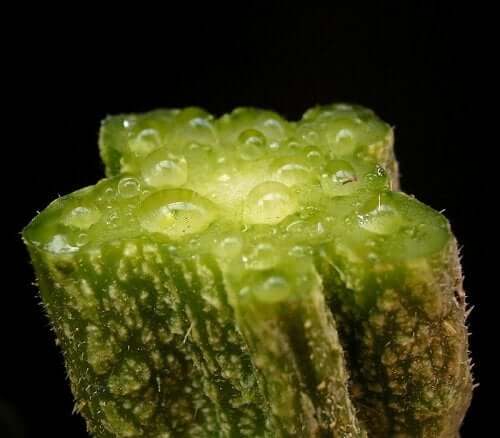
You can buy sage leaves in herb stores, or in bags sold commercially at the supermarket.
For many people, sage is the natural ingredient of choice when it comes to skin care. This is because it’s an anti-inflammatory, as confirmed in this study by the Center for Research and Development of Medicines in Cuba (CIDEM).
This plant reduces hot flashes and relaxes the body, according to this study by the Complutense University in Madrid.
Ingredients
- 1 Tbsp. sage (10 g)
- 1 cup water (250 ml)
How to use it
- Firstly, add the tablespoon of sage to the cup of boiling water, and then cover.
- After 10 minutes of steeping, strain with a colander and drink.
- Repeat twice a day.
7. Roman chamomile massage
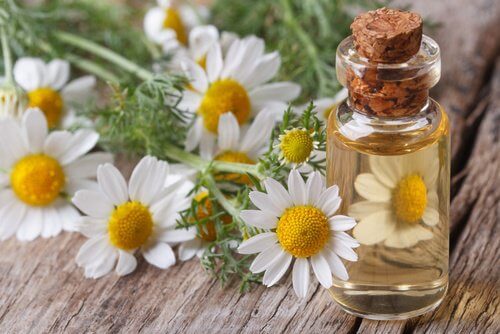
It is believed that using roman chamomile oil in massages can help to control menopausal hot flashes.
However, there is no scientific evidence to support these claims.
Ingredients
- 10 drops of roman chamomile oil
How to use it
- Pour the oil into your hands and rub it on the areas that are most heavily affected by sweat.
- Use every night, and if necessary, use throughout the day as well.
8. Red clover
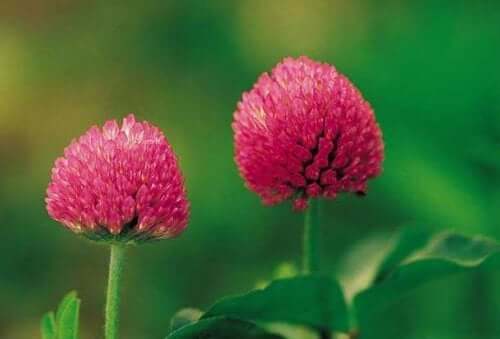
Red clover infusion is an ancient remedy for reducing cholesterol, improving circulation, and helping to control hot flashes, as shown in this study carried out by the National Endocrinology Institute.
Ingredients
- 2 tsp. dried red clover (10 g)
- 1 cup water (250 ml)
Directions
- Firstly, add the red clover to one cup of boiling water.
- Steep for 30 minutes, then strain and drink.
- Drink up to three cups a day.
For best results, remember that you absolutely must improve your diet and increase your consumption of calcium, potassium, and vitamins D and E.
Also try to wear clean cotton or linen clothes for sleeping, as these can be great for reducing the effects of hot flashes.
All cited sources were thoroughly reviewed by our team to ensure their quality, reliability, currency, and validity. The bibliography of this article was considered reliable and of academic or scientific accuracy.
- Arriagada, M. M., Arteaga, E. U., Bianchi, M. P., Brantes, S. G., Montaño, R. V, Osorio, E. F., … Villaseca, P. D. (2005). RECOMENDACIONES DE TRATAMIENTO EN LA MENOPAUSIA. REV CHIL OBSTET GINECOL. http://doi.org/10.4067/S0717-75262005000500011
- Bueno, M. I. C., Pérez, A. M. S., & Zayas, O. G. (2011). Climaterio y menopausia. Revista Cubana de Medicina General Integral.
- Manuel Vargas-Hernández, V., Acosta-Altamirano, G., Adán Moreno-Eutimio, M., Manuel Vargas-Aguilar, V., Flores-Barrios, K., & María Tovar-Rodríguez, J. (2013). Terapia hormonal de reemplazo durante la menopausia. Del riesgo al beneficio. Rev Hosp Jua Mex.
This text is provided for informational purposes only and does not replace consultation with a professional. If in doubt, consult your specialist.








